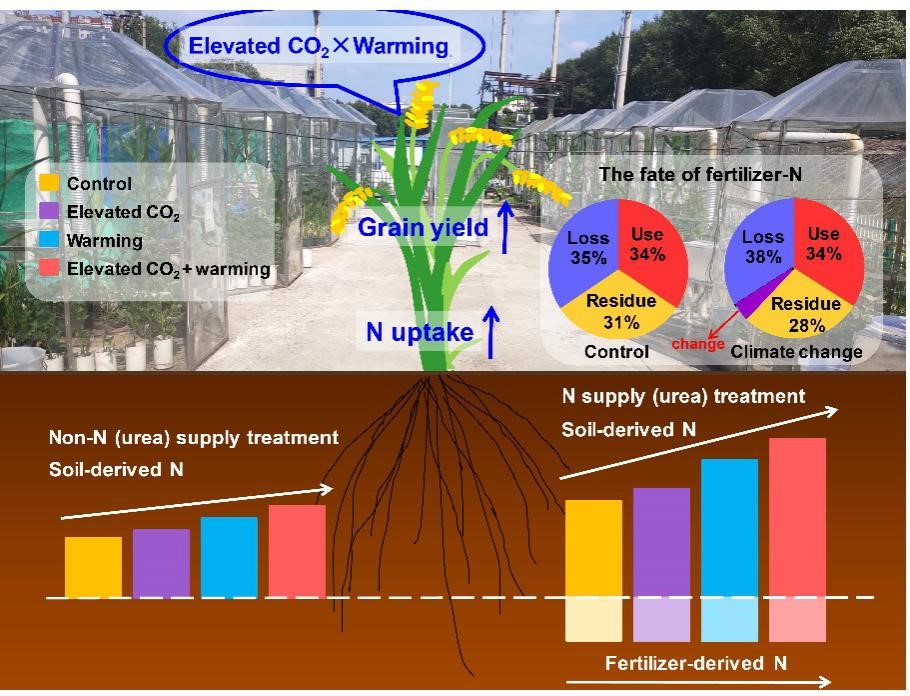Plant nitrogen (N) acquisition is essential to crop growth and yield. A rational N management strategy in farming systems under climate change is highly recommended, but rice N uptake and its origins (soil-derived N or fertilizer-derived N) in paddy soils in northeast China in response to elevated atmospheric CO2 and warming remains largely unknown. Thus, it is necessary to clarify how elevated CO2 and warming interactively influence soil N mineralization in the rhizosphere of rice (Oryza sativa L.), given that the N mineralization process in anaerobic paddy soils differs from that of aerobic upland soils.
The researchers from the Northeast Institute of Geography and Agroecology (IGA) of the Chinese Academy of Sciences investigated the soil- or fertilizer-derived N uptake and yield of different cultivars of rice in response to climate change, and examined the impacts of climate change on N mineralization and relevant microbial mechanisms in the rhizosphere of rice plants.
The researchers found that elevated CO2 and warming significantly increased plant N uptake, and soil-N rather than fertilizer-N was the source of the increased N uptake. The increased soil-N uptake resulted in the enhancement of rice yield under climate change. Urea application did not alter the yield response to elevated CO2 and warming compared to the non-N supply, but did stimulate plant uptake of the soil-derived N. Although genetic improvement of rice germplasm resulted in an increase in plant N acquisition and yield, the history of crop breeding since 1935 did not alter the climate-change-induced response in terms of plant N acquisition.
Co-elevation of CO2 and temperature increased microbial biomass C and N and significantly increased N mineralization. The absolute abundances of the N-mineralization genes chiA, pepA, pepN, and urea hydrolysis gene ureC in the rhizosphere also increased under elevated CO2 and warming, corresponding to the additional N mineralization and photosynthetic C allocation into the soil.
These studies suggested that climate change may lead to the depletion of the recalcitrant soil N pool in paddy soils, and that fertilizer-N-use efficiency may need to be factored into future breeding for rice genotypes adapting well to climate change; Co-elevation of CO2 and temperature stimulated microbially mediated soil N mineralization in the rhizosphere of rice, posing a risk on the acceleration of soil organic matter decomposition.
Those findings have been published in Agricultural and Forest Meteorology, and Biology and Fertility of Soils.
The full information of the article:
Jinyuan Zhang, Yansheng Li, Zhenhua Yu*, Jonathan Adams, Caixian Tang, Guanghua Wang, Xiaobing Liu, Junjie Liu, Ashley Franks, Judong Liu, Shaoqing Zhang, Jian Jin*. (2022). Elevated atmospheric CO2 and warming enhance the acquisition of soil-derived nitrogen rather than urea fertilizer by rice cultivars. Agricultural and Forest Meteorology. 324, 109117.
Jinyuan Zhang, Zhenhua Yu, Yansheng Li, Guanghua Wang, Xiaobing Liu, Caixian Tang, Jonathan Adams, Junjie Liu, Judong Liu, Shaoqing Zhang, Junjiang Wu, Jian Jin*. (2022). Co–elevation of CO2 and temperature enhances nitrogen mineralization in the rhizosphere of rice. Biology and Fertility of Soils.
Contact:
Prof. Jian Jin
Northeast Institute of Geography and Agroecology, Key Laboratory of Mollisols Agroecology , Chinese Academy of Sciences, Harbin 150081, China.
mail: jinjian@iga.ac.cn


